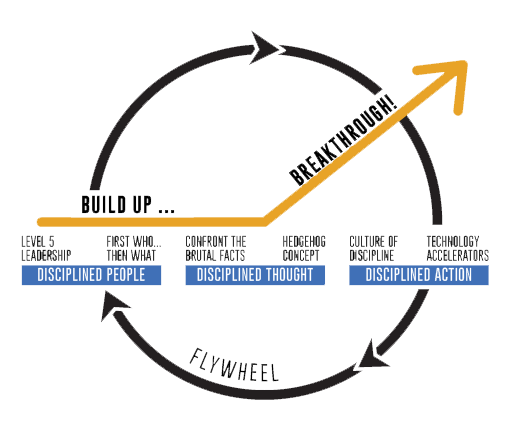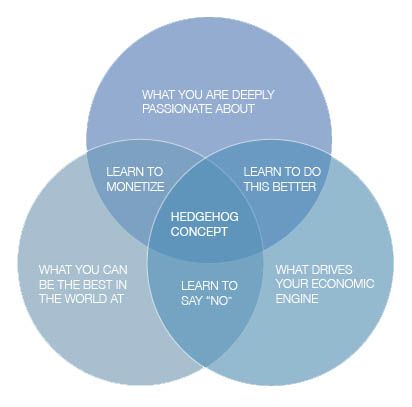[display-name-category]
[post_author]
A couple of months back I shared my thoughts on how the concepts from ‘Great by Choice’ applied to successful AdWords account  management.
management.
The post resulted in many comments and questions across our social media platforms. This is why I decided to follow up with a similar analysis of ‘Good to Great’, also written by Jim Collins, which was my first read in his collection of books about company sustainability and growth.
What particularly fascinated me about this bestseller was the scientific proof of concept and ideas behind the strategies described.
The widely popular “Good to Great: Why Some Companies Make the Leap… And Other’s Don’t”, is the final result of an extensive 5-year project where Jim Collins and his team studied 1435 companies, all of which had a good performance. In the end, they further examined the characteristics of the final 11 out of 1435 companies that transcended from Good to Great.
The findings from this research revealed that all of the 11 great companies shared a set of similarities that distinguished them from the regular good companies.
When reading business books, I like to draw similarities to my own business and if applicable, see how proven concepts like these can be implemented and replicated throughout the organization.
From a management perspective, I always favor to back up theories and strategies with statistical validation (whenever possible). For this reason, this book and its compelling detail of data, have been great ammunition for spreading excellence and good behaviors across our departments.
We actually have 3 copies of ‘Good to Great’ in our company library now because of its popularity amongst our team members.

Illustration adapted from the book
The Right People Come Before the Right Strategy
One of the first characteristics of great companies that Jim Collins identifies is that their ‘Level 5 leaders’ are truly committed to assembling a strong leadership team with shared values and beliefs.
It is of greater priority for these leaders to ‘get the right people on the bus’ rather than figuring out where they are heading to with the bus. In other words, gathering a solid and talented team comes before determining what products, direction, or strategies are needed.
On the contrary, good companies that never became great and able to produce continuous sustained results often failed to do so because they didn’t have a strong team in place. They relied instead on having a superstar leader, the ‘Rockstar CEO’, who carried the entire company on his back towards success.
Tweet this quote: http://ctt.ec/7a3eQ
However, without a solid foundation and only relying on the brilliance of one individual, these companies became very vulnerable and started to decline in performance once their respective leader stepped down from the thrown.
The same can be advised to companies in search of success with Online Marketing. Before deciding on goals, strategies, or required resources, the very first initiative should always be to partner up with the right team of experts.
Once you have a team of experts advising you on the reality of the market-space and competition from an online marketing perspective, you might find out that your preliminary plan cannot be accomplished. Hence you should always carefully consider which team you want to be leading your online strategy.
Like the saying goes ‘Hire slow, and fire fast’ this particularly applies to the jungle of online marketing agencies. I’ve first hand experienced that you can teach most educated people the science behind online marketing if they’re just disciplined and driven with a healthy work ethic. At the end of the day, online marketing is not rocket science, but it’s still so complex that you won’t experience success by cutting corners.
For these reasons I personally interview all new hires after they’ve been screened and tested by our HR department. This certainly is a challenge now when we are scaling up our company by 15-20 new additions every month. But I cannot stress enough how important it is to focus on selecting the right team for the job.
A Jack of All Trades or a Master with A Specialty?
One of my absolute favorite principles is ‘The Hedgehog Concept’ which Jim Collins uses as a metaphor to illustrate that sometimes simplicity and focus are the pathways to greatness.
To make his point, Collins uses the example of a Hedgehog vs. a Fox. Where the Fox knows many defense tactics when being attacked by a predator, the Hedgehog masters only one technique but does it very well – to roll up in a ball. Even though this defense mechanism is surprisingly simple and less sophisticated than Fox’s multiple defense techniques, it’s extremely effective and works impressively.
The takeaway is that the Good to Great companies enable themselves for triumph by focusing all their activities towards selective initiatives and how to master these choices, instead of dispersing their energy across multiple products, markets or strategies.
Click to tweet: http://ctt.ec/AI3W3
At White Shark Media, we also try to live by the Hedgehog concept and specialize each of our team members on selective verticals or channels from the get-go.
While some agencies proudly broadcast that they can manage Social Media, Email Marketing, Paid Search Advertising and Conversion Rate Optimization under one umbrella, with one point of contact; we understand that in order to become a true specialist in a field, you must steer all your focus into that specific area and practice this skill repetitively until you master it and possess unconscious competence.
The same goes for our team members who want to learn everything about Paid Search Advertising; from e-commerce, campaign management entailing Google Shopping Campaigns and Shopping Comparison Engines, to Small Business Local advertising which requires focus on call tracking and mobile marketing.
Whether you’re a company or a professional trying to establish a long-lasting successful career, you’ve to challenge yourself and find the ‘sweet spot’ within the center of 3 vital questions:
1) What are you passionate about?
I.e. what gets you excited and fuels you with energy and motivation. Becoming great at something requires consistency and fanatic discipline; you cannot get bored and shift focus after a short period of time.
2) What can you be the very best in the world?
I.e. strive to become a thought-leader, pioneer, or record-breaker in one area instead of being mediocre in multiple fields.
3) What drives your economic engine?
I.e. you can be obsessively passionate about a trade or an idea and have the passion to become the best in the world at it, but if you can’t pay the bills with that, you will soon starve to elimination.

Illustration adapted from Whatconsumesme.com
This methodology is also supported very well by one of my favorite authors in Digital Marketing, the former Googler and Analytics Evangelist Avinash Kaushik, in his ‘Manifesto for a Magnificent Career’.
There’s No Such Thing As an Overnight Success or Get Rich Scheme
In business, especially if you want to build a great company or career for that matter, there’s no such thing as a shortcut to success. Collins pinpoints this fact in his research and exemplifies it with the concept ‘The Flywheel and Doom Loop’.
The idea is that in order to experience incremental success and gain serious traction in any business-related matter, one must stick to a strategy and continuously make decisions and take actions that foster the ‘Hedgehog Concept’.
The flywheel is a heavy wheel that takes an immense amount of energy to set in motion, and in order to gain speed, it requires constant and steady effort, rather than a quick acceleration.
Great companies or individuals understand this concept and dedicate relentless quantities of energy towards their areas of focus which with time, results in an accumulation of positive outcomes and reached momentum. This process is characterized as ‘The Flywheel Effect’.
Tweet this quote: http://ctt.ec/d1Y6r
Conversely, mediocre or good companies often fall into ‘The Doom Loop’, a vicious circle of constant changes in direction and strategies which consequences into never reaching any momentum.
The disappointing outcome essentially results in loss of culture and morale in personnel, along with vanished market shares and resources. These are the companies that frequently replace one leader with another expecting to find a “hero” who can magically turn the business around by swinging their magic wand.
When comparing these theories with Online Marketing and our organization, I see a lot of resemblances. A common challenge we face when dealing with less educated clients (it happens at times) is that a successful Online Marketing campaign takes time to build up and sustain.
You need to focus on your end goal and optimize your efforts according to the accrued data, which takes time to collect. Only with consistency in efforts and a bit of patience, you will accomplish successful results. Changing your strategies, platforms, or agencies all the time will only result in loss of time and money.

Tweet this quote: http://ctt.ec/U4UEd
You can also draw a direct comparison to our client relationships and expectations setting to campaigns. If we, unfortunately, acquire a client who never fully trusts our expertise and demands a constant shift in strategy in the hopes of finally hitting a magic ‘aha moment’ where everything turns around overnight; we can with 100% certainty predict campaign failure and resources wasted from all parties.
If instead, we have a well-established timeline for results and complete confidence from the client in the plan-of-action, our ongoing methodical campaign optimizations will translate into successful outcomes over time.
The positive results feed further excitement and resources from the client for greater reach, and the velocity of performance can thereby attain unexpected heights, just like the flywheel effect.
Like Everything Else in Life, There’s No Shortcut to Success
On a final note, I highly encourage you to grab a copy of this book whether you’re in sales, account management, or in an executive position. All the proven concepts from this bestseller, which by the way are extracted from companies like Wells Fargo, Gillette, and Kimberly-Clark, can easily be applied to areas of your day-to-day responsibilities and might give you a fresh new perspective on challenges.
Besides the above-mentioned themes, there are also very interesting chapters about how to create a culture of discipline, how great companies utilize technology along with how to confront the brutal facts of your situation for bettered performance.
Altogether, the takeaways are universal and showcase that disciplined people, with disciplined thoughts who perform disciplined actions are the most significant factors for achieving greatness in business, just like with online marketing.
Video Transcription
Just like most things in AdWords, whether pausing your campaign is the right choice depends on a number of aspects of your business. For example:
What’s Your Budget?
If you don’t have a limited budget, I recommend keeping your PPC campaign on for the following reason: It can increase brand awareness. Since fewer people may have their ads activated for the holiday, your brand can easily stand out.
Are You Open for Business?
If your business offers 24/7 emergency services, you should leave your campaign running so that people can still contact you.
Do You Have an Ecommerce Website?
As an e-commerce business owner, you should know there are certain holidays you can’t miss, for example, Black Friday and Cyber Monday. In this case, I recommend you increase your budget and bids for these holidays.
How Can You Pause Your Ads?
Let’s say you have set your campaign scheduled to run from 7 am to 5 pm Monday through Friday and 10 am to 3 pm on Saturday.
Instead of editing your daily ad schedule and deleting or changing your time settings, you can use Adwords Automated rules. Check out these 3 easy steps.
Step one, log into your Adwords account and select the campaign(s) you want to pause, then choose “Automate.” Under the “Create Rule For Campaigns” menu, select the “Pause campaigns when…” option.
Step two, you will now be in the Pause campaign rule options. Look for the Frequency section and select the “One Time” option. Next, choose the date you want to start pausing your campaigns.
This will help you remember what the rule is for if you need to make some changes or review the rule in the Managed Rules section.
You’ve Successfully Paused Your Ads!
Now, Let me show you how to turn them back on.
Go back to your campaign dashboard and click the ‘Automate” button again, just like you did in step 1. This time select the “Enable campaigns when…” option. Select which day and time to turn them back on.
Lastly, name the rule so you can identify it later. That’s it! Your ads will now be paused and enabled, on the specific dates and times, you have set.
Take some time, and create these rules all at once for every holiday you don’t want your ads to run.
I hope you found this helpful, thanks for watching!









